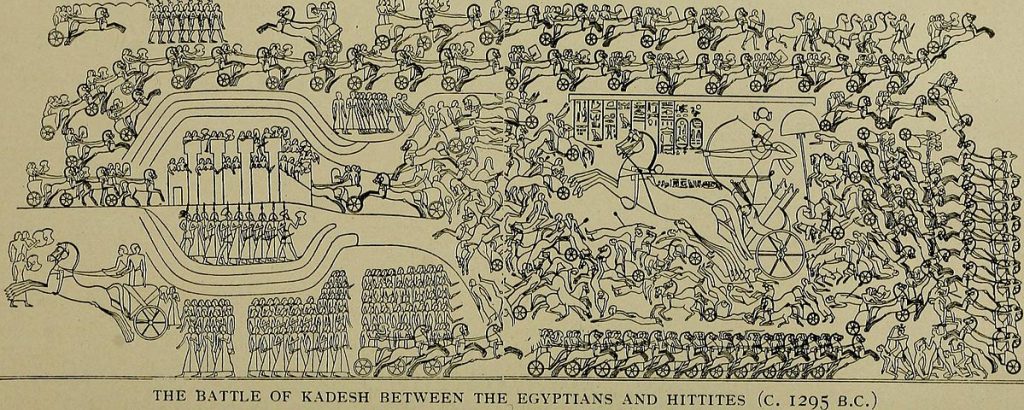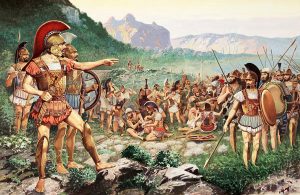The once calm and silent Egyptian landscape became flooded with the sounds of hooves crackling and wheels turning as the Egyptian imperial army approached the land known as Kadesh. The land was located along the Orontes River just upstream from Lake Homs, located in modern day Syria. The Egyptian soldiers stood dormant, gazing at land that once belonged to their king, filled with determination, and longing for revenge against their enemy. Awaiting the order to attack, they readied themselves for battle. This was the prelude to the historic clash known as the Battle of Kadesh.
The battle involved the Egyptians and the Hittites, and it was over land in Syria that the Hittites had recently taken from the Egyptians. Both sides armed themselves with bronze weaponry and horse-drawn chariots equally equipped for a long and taxing battle. The siege by the Egyptians on Kadesh is known to have lasted three months.1 This battle involved between five to six thousand chariots, the largest such engagement in military history. The Hittites were known to be highly skilled in chariot-based combat due to the help of a horse trainer known as Kikkuli. Kikkuli’s teachings helped the horses to increase both endurance and stamina. His teachings were so well regarded that royalty in neighboring Indo-European civilizations adopted his teachings for their own.2 This advanced knowledge and practice that was available to the Hittites already put them at an advantage when facing the Egyptians on chariots. The Egyptians, however, had certain advantages that the Hittites lacked. The Egyptian army, under the command of Ramses II, contained 35,000 men, while the Hittite army, headed by Muwutallis II, only had 27,000 men. Despite their differences, both sides seemed able to face the opposing army with confidence.

Early in the battle the Hittites gained the advantage by having two of their men pose as Egyptian commanders. They “informed” Ramses of the location of the Hittite camp. Ramses then, without thinking, moved his army to the location of the camp. When he arrived, he realized it had been a trap. The Hittites in fact were east of Kadesh and were within striking distance of the Egyptian army stationed there.3 In addition, the rest of the Egyptian army was stationed within striking distance of Kadesh; however, they were commanded to remain idle until Ramses sent word to them. Ramses, being far north from the rest of his army, was unable to send word fast enough about the ambush. Consequently, the Hittite army killed the majority of the Egyptians stationed in Kadesh. The Hittites were able to overpower the Egyptian troops because those stationed in Kadesh were left with no chariots, while the Hittites sent the majority of their chariot forces to overwhelm those Egyptians. Ramses was left with no other choice but ride to Kadesh with his bodyguards to face the Hittite army, while the remainder of the Egyptian army marched towards Kadesh. This act not only illustrates Ramses bravery but also his leadership. Once he arrived, Ramses and his bodyguards attacked the Hittite chariots and infantry units. Muwutallis, however, was not easily discouraged. He continued to send more chariots to Kadesh to overwhelm Ramses. Ramses in response drove all the reinforcements back. Ramses did this by attacking the chariots from the rear wheels. By doing this the Hittite riders would lose control of their horses and have to fight on foot. The Hittites who were left to fight on foot were then no match for Ramses’ forces, armed with his own chariots. This continued until the rest of the Egyptian forces rendezvoused with Ramses at Kadesh. Now left with no other options, Muwutallis sent all of his remaining forces to Kadesh to push back the Egyptian army. The battle lasted for hours, until night fell. Due to both armies being unable to fight in the dark, Ramses and Muwutallis both retreated their armies. The fight for Kadesh, however, continued for months after this battle, until Ramses obtained the victory by driving out Muwutallis’s men and reclaiming Kadesh, according to Egyptian records.4
The results of the battle are still inconclusive. There are many accounts of how the battle ended, even conflicting accounts from the same side. The Egyptian records, for instance, state that the battle ended in a treaty between Ramses and Muwutallis. This record conflicts with Ramses’ proclamation of retaking Kadesh, since the alleged treaty gave Hittites control over portions of Kadesh and other lands. The Hittites mention in their records that the battle was won by Muwutallis. Muwutallis also proclaimed that he forced Ramses to retreat from Kadesh.
This conflict of records leads to several possibilities regarding the outcome. Both sides could have failed to drive out the other, leading Kadesh to be destroyed by the warfare. Ramses could have been spreading propaganda of a victory to disguise his failure, while Muwutallis’s could have done the same. Though the true outcome may be lost to time, the battle still holds merit. The battle was not only fought over a long period of time. It had strategies enacted by both sides and was one of the largest known battles to have used chariot warfare.
- Spencer Tucker, Battles that changed history: an encyclopedia of world conflict (ABC-CLIO, 2010), 4. ↵
- Peter Raulwing, The Kikkuli Text Hittite Training Instructions for Chariot Horses in the Second Half of the 2nd Millennium BC and Their Interdisciplinary Context, PDF (Peter Raulwing, 2009), 5. ↵
- The Greenhaven Encyclopedia of Ancient Mesopotamia, 2007, s.v. ” Battle of Kadesh (ca. 1274 B.C.),” by Don Nardo. ↵
- Antonio Santosuosso, “Kadesh Revisited: Reconstructing the Battle Between the Egyptians and the Hittites,” The Journal of Military History 60, no. 3 (1996): 425. ↵



37 comments
Jonathan Perez
This article was well written and told an interesting story. With this battle being so far back into history it is interesting that there is no definitive answer as to how it concluded, with both sides declaring victory in one way or another. The article also was interesting in how it described warfare in chariots and how both sides utilized their given strengths yet could not hold the upper hand for long. Overall well done and a great read.
Suvesh Vasal
I had never heard of this battle so I was not sure how I was gonna comprehend the article. However, you explained this very well and made it clear and concise. Your research must have been very good considering how detailed this was. I am positive that it was hard to find your research on a topic that happened so long ago. Good article.
Caroline Bush
Interesting article! I enjoyed the amount of detail in your article and how you described such a confusing battle. I didn’t realize that their was no real winner in this battle simply because it cant be confirmed. It would seem that during this battle there was a lot going on so it couldn’t be clearly recorded. I enjoyed the amount of detail you put into this article and could tell it was very well researched. Overall I really enjoyed this article and thought that the topic was very interesting.
Benjamin Arreguin
The conflicts in the articles that summarized the battles is very interesting because typically, battles like these were documented in extreme detail. For their to be confusion as to what really happened is unique, and the battle itself was very strategic, and more of a battle of mind over man power which is awesome. The Egyptians have always interested me because of how they structured their society, so to find out more about how their fighting style is very entertaining and informative as well.
Carlos Sandoval
I had no idea what to expect when clicking on this article, the title really grabbed my attention. It seems a lot was happening during this war and it made it hard to follow. This was a still a good and very interesting story, I did not know it was even possible to not have clear winner in a war. This article had very good research and provided good information in order to tell the story well.
Johnanthony Hernandez
Until reading your article I had never heard of the Battle of Kadesh or of Kadesh. I would guess that since there is no definitive piece of record on the outcome of the battle, it was lost to history. As mentioned before, not knowing of the battle and the only information is from your article, I would think that since Ramses II had 8,000 more men in his army that he may have been able to overwhelm the Hittite army or that Muwutallis II would have had a home field advantage over the Egyptians. Either way we may never know who the victor truly was, good work.
Samuel Ruiz
This article was very interesting. Justin did a great job of setting the scene of the battle, which made a great first impression and kept me reading. I found it interesting and almost unbelievable that the Hittites were able to pull off a trick such as posing as Egyptian commanders and leading them into a trap. While the battle may have been chaotic for Ramses and his army, I found his strategies to continue fighting to be clever. It is unfortunate that the true ending of the battle has not yet been confirmed.
Alexander Cruz
Absolutely a battle without a clear winner. Hard to write about something with so much historical incorrectness, but this article still did a great job explaining both sides without bias. Good research and information. I also think highly of Ramses for being as brave and noble as he was, a true leader. Lastly the fact that they both withdrew their troops at night shows kind of a respect almost that they had for their men to not make them fight in the pitch black darkness.
-AC
Timothy ODekirk
I absolutely love ancient Egypt and the thought of an epic battle between two civilizations fighting for land, money, and power. But, what really won me over in the Battle of Kadesh was the fact that it was a chariot battle. Another aspect that I thought was interesting of the Battle of Kadesh were the sides fighting against each other: the Egyptians and the Hittites. I just seemed like these two civilizations were so powerful and the odds just seemed to stack up against each other. The Egyptians had twice as more men than the Hittites did, but the Hittites had exquisite training in chariot combat, which allowed for their horses to have more endurance and stamina while in combat. It seems like it was hard to predict who would become victorious from this battle given the odds of both civilizations. But, that was the most interesting part for me, was that no one came victorious from this battle. The was no winner. I still find that odd and strange, but so interesting at the same time.
Jacob Johnson
I feel like Muwutallis had a greater chance at victory since he had the better strategy, however from the way the battle was described it sounded like Ramses and his army put up a better fight. While the Egyptians did have a larger army than the Hittites I think Ramses was more naïve, and though Muwutallis was more methodical and deceptive he didn’t seem to have much of a strategy after the initial strike. So I really don’t know who deserved to lose between Ramses for being too gullible and leaving Kadesh semi-defenseless, or Muwutallis for his lack of foresight to send enough soldiers to be able capture and then defend Kadesh or better yet to be able to capture Ramses himself.